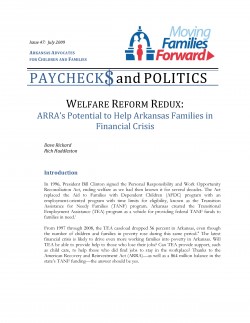
In 1996, President Bill Clinton signed the Personal Responsibility and Work Opportunity Reconciliation Act, ending welfare as we had then known it for several decades. The Act replaced the Aid to Families with Dependent Children (AFDC) program with an employment-oriented program with time limits for eligibility, known as the Transition Assistance for Needy Families (TANF) program. Arkansas created the Transitional Employment Assistance (TEA) program as a vehicle for providing federal TANF funds to families in need.
From 1997 through 2008, the TEA caseload drop ped 56 percent in Arkansas, even though the number of children and families in poverty rose during this same period. The latest financial crisis is likely to drive even more working families into poverty in Arkansas. Will TEA be able to provide help to those who lose their jobs? Can TEA provide support, such as child care, to help those who did find jobs to stay in the workplace? Thanks to the American Recovery and Reinvestment Act (ARRA)—as well as a $64 million balance in the state’s TANF funding—the answer should be yes.
